Deck 2: Rate of Change: the Derivative
Question
Question
Question
Question
Question
Question
Question
Question
Question
Question
Question
Question
Question
Question
Question
Question
Question
Question
Question
Question
Question
Question
Question
Question
Question
Question
Question
Question
Question
Question
Question
Question
Question
Question
Question
Question
Question
Question
Question
Question
Question
Question
Question
Question
Question
Question
Question
Question
Question
Question
Question
Question
Question
Question
Question
Question
Question
Question
Question
Question
Question
Question
Question
Question
Question
Question
Question
Question
Question
Question
Question
Question
Question
Question
Question
Question
Question
Question
Question
Question

Unlock Deck
Sign up to unlock the cards in this deck!
Unlock Deck
Unlock Deck
1/132
Play
Full screen (f)
Deck 2: Rate of Change: the Derivative
1
The height of an object in feet above the ground is given in the following table.  If the height of the object is doubled, the average velocity over any interval
If the height of the object is doubled, the average velocity over any interval
A)doubles also.
B)stays the same.
C)is cut in half.
 If the height of the object is doubled, the average velocity over any interval
If the height of the object is doubled, the average velocity over any intervalA)doubles also.
B)stays the same.
C)is cut in half.
doubles also.
2
Given the following data about the function f, estimate  .
. 
 .
. 
5
3
Given the following data about the function f, the equation of the tangent line at x=3.2 is approximately y = _____x+_____. Use the nearest right-hand value to make your estimate. 

Part A: 5
Part B: -6.5
Part B: -6.5
4
Let  . What is the change in
. What is the change in  between t=2 and t=5?
between t=2 and t=5?
 . What is the change in
. What is the change in  between t=2 and t=5?
between t=2 and t=5?
Unlock Deck
Unlock for access to all 132 flashcards in this deck.
Unlock Deck
k this deck
5
The following figure is the graph of  , the cumulative number of customers served in a certain store during business hours one day, as a function of the hour of the day. About when was the store the busiest?
, the cumulative number of customers served in a certain store during business hours one day, as a function of the hour of the day. About when was the store the busiest? 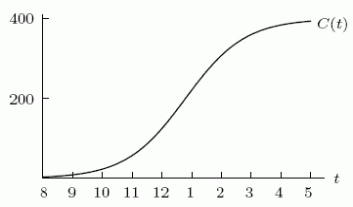
A)11am
B)1pm
C)3pm
D)5pm
 , the cumulative number of customers served in a certain store during business hours one day, as a function of the hour of the day. About when was the store the busiest?
, the cumulative number of customers served in a certain store during business hours one day, as a function of the hour of the day. About when was the store the busiest? 
A)11am
B)1pm
C)3pm
D)5pm

Unlock Deck
Unlock for access to all 132 flashcards in this deck.
Unlock Deck
k this deck
6
Let  be the length of the side of a cube in terms of its volume. As V decreases, does the rate of change of x increase or decrease?
be the length of the side of a cube in terms of its volume. As V decreases, does the rate of change of x increase or decrease?
 be the length of the side of a cube in terms of its volume. As V decreases, does the rate of change of x increase or decrease?
be the length of the side of a cube in terms of its volume. As V decreases, does the rate of change of x increase or decrease?
Unlock Deck
Unlock for access to all 132 flashcards in this deck.
Unlock Deck
k this deck
7
The graph of  is shown below. Arrange the following values in order from smallest to largest by placing a "1" by the smallest, a "2" by the next smallest, and so forth.
is shown below. Arrange the following values in order from smallest to largest by placing a "1" by the smallest, a "2" by the next smallest, and so forth.
A. B.
B.  C.
C.  D. slope AB E. 1 F. 0
D. slope AB E. 1 F. 0 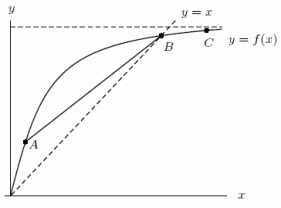
 is shown below. Arrange the following values in order from smallest to largest by placing a "1" by the smallest, a "2" by the next smallest, and so forth.
is shown below. Arrange the following values in order from smallest to largest by placing a "1" by the smallest, a "2" by the next smallest, and so forth.A.
 B.
B.  C.
C.  D. slope AB E. 1 F. 0
D. slope AB E. 1 F. 0 

Unlock Deck
Unlock for access to all 132 flashcards in this deck.
Unlock Deck
k this deck
8
A certain function f is decreasing and concave down. In addition,  and
and  . Which of the following are possible zeroes of f? Select all that apply.
. Which of the following are possible zeroes of f? Select all that apply.
A)3
B)5
C)7
D)9
 and
and  . Which of the following are possible zeroes of f? Select all that apply.
. Which of the following are possible zeroes of f? Select all that apply.A)3
B)5
C)7
D)9

Unlock Deck
Unlock for access to all 132 flashcards in this deck.
Unlock Deck
k this deck
9
From the following graph, estimate  .
. 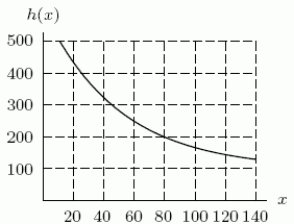
A)-3.25
B)-2.25
C)-1.25
D)-0.25
 .
. 
A)-3.25
B)-2.25
C)-1.25
D)-0.25

Unlock Deck
Unlock for access to all 132 flashcards in this deck.
Unlock Deck
k this deck
10
The height of an object in feet above the ground is given in the following table. The average velocity over the interval  is _____ feet/sec.
is _____ feet/sec. 
 is _____ feet/sec.
is _____ feet/sec. 

Unlock Deck
Unlock for access to all 132 flashcards in this deck.
Unlock Deck
k this deck
11
The growth graph in the following figure shows the height in inches of a bean plant during 30 days. On the 15th day, the plant was growing about _____ inches/day. Round to 2 decimal places. 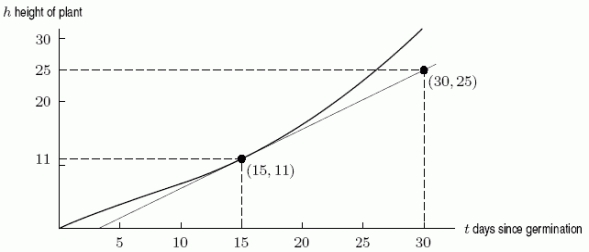


Unlock Deck
Unlock for access to all 132 flashcards in this deck.
Unlock Deck
k this deck
12
Given the following data about the function f, give the average rate of change of f between x=3.2 and x=3.8. Round to 2 decimal places. 


Unlock Deck
Unlock for access to all 132 flashcards in this deck.
Unlock Deck
k this deck
13
Estimate  when
when  . Take smaller and smaller intervals until your estimate is accurate to 3 decimal places.
. Take smaller and smaller intervals until your estimate is accurate to 3 decimal places.
 when
when  . Take smaller and smaller intervals until your estimate is accurate to 3 decimal places.
. Take smaller and smaller intervals until your estimate is accurate to 3 decimal places.
Unlock Deck
Unlock for access to all 132 flashcards in this deck.
Unlock Deck
k this deck
14
If  is the length of the side of a cube in terms of its volume, then calculate the average rate of change of x with respect to V over the interval 1
is the length of the side of a cube in terms of its volume, then calculate the average rate of change of x with respect to V over the interval 1
 is the length of the side of a cube in terms of its volume, then calculate the average rate of change of x with respect to V over the interval 1
is the length of the side of a cube in terms of its volume, then calculate the average rate of change of x with respect to V over the interval 1
Unlock Deck
Unlock for access to all 132 flashcards in this deck.
Unlock Deck
k this deck
15
Using a difference quotient, compute  to 2 decimal places for
to 2 decimal places for  .
.
 to 2 decimal places for
to 2 decimal places for  .
.
Unlock Deck
Unlock for access to all 132 flashcards in this deck.
Unlock Deck
k this deck
16
Recently Esther swam a lap in an Olympic swimming pool (the length of the pool is 50 meters, and the length of a lap is 100 meters); her times for various positions s (in meters from her starting point) during the lap are given in the following table. Her approximate velocity at time t=3.2 seconds was _____ m/sec. Round to 3 decimal places. 


Unlock Deck
Unlock for access to all 132 flashcards in this deck.
Unlock Deck
k this deck
17
A certain function f is decreasing and concave down. In addition,  and
and  . Which of the following are possible values for
. Which of the following are possible values for  ? Select all that apply.
? Select all that apply.
A)3
B)4
C)5
D)6
 and
and  . Which of the following are possible values for
. Which of the following are possible values for  ? Select all that apply.
? Select all that apply.A)3
B)4
C)5
D)6

Unlock Deck
Unlock for access to all 132 flashcards in this deck.
Unlock Deck
k this deck
18
Given the graph below of  , is
, is  positive, negative, zero or undefined?
positive, negative, zero or undefined? 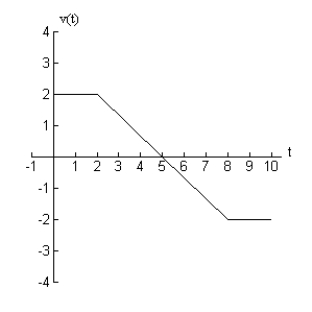
 , is
, is  positive, negative, zero or undefined?
positive, negative, zero or undefined? 

Unlock Deck
Unlock for access to all 132 flashcards in this deck.
Unlock Deck
k this deck
19
An amount of $500 was invested in 1970 and the investment grew as shown in the following table. (Amounts are given for the beginning of the year.) The average rate of increase of the investment between 1980 and 1990 is _____ per year. 


Unlock Deck
Unlock for access to all 132 flashcards in this deck.
Unlock Deck
k this deck
20
The graph of  in the figure gives the position of a particle at time t. Arrange the following values in order from smallest to largest by placing a "1" by the smallest, a "2" by the next smallest, and so forth.
in the figure gives the position of a particle at time t. Arrange the following values in order from smallest to largest by placing a "1" by the smallest, a "2" by the next smallest, and so forth.
A. average velocity on .
.
B. average velocity on .
.
C. instantaneous velocity at t=1.
D. instantaneous velocity at t=3.
E. instantaneous velocity at t=10.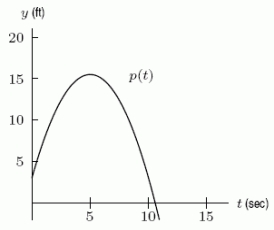
 in the figure gives the position of a particle at time t. Arrange the following values in order from smallest to largest by placing a "1" by the smallest, a "2" by the next smallest, and so forth.
in the figure gives the position of a particle at time t. Arrange the following values in order from smallest to largest by placing a "1" by the smallest, a "2" by the next smallest, and so forth.A. average velocity on
 .
.B. average velocity on
 .
.C. instantaneous velocity at t=1.
D. instantaneous velocity at t=3.
E. instantaneous velocity at t=10.


Unlock Deck
Unlock for access to all 132 flashcards in this deck.
Unlock Deck
k this deck
21
Using the graph of  , at x=B is
, at x=B is  positive ?
positive ? 
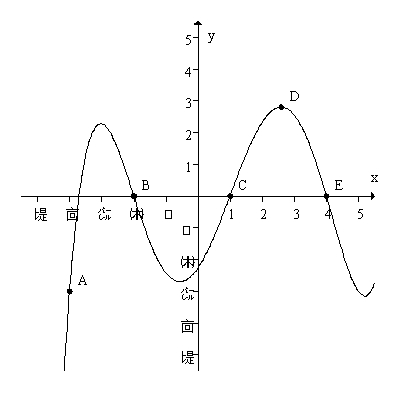
 , at x=B is
, at x=B is  positive ?
positive ? 


Unlock Deck
Unlock for access to all 132 flashcards in this deck.
Unlock Deck
k this deck
22
Suppose  is the height in inches of a person who is t years old. Is it reasonable that
is the height in inches of a person who is t years old. Is it reasonable that  ?
?
 is the height in inches of a person who is t years old. Is it reasonable that
is the height in inches of a person who is t years old. Is it reasonable that  ?
?
Unlock Deck
Unlock for access to all 132 flashcards in this deck.
Unlock Deck
k this deck
23
A certain bacterial colony was observed for several hours and the following conditions were reported. Let  be the number of bacteria present after t hours.
be the number of bacteria present after t hours.  There were 1000 bacteria after 5 hours.
There were 1000 bacteria after 5 hours.  The growth rate was never negative and never exceeded 100 per hour.
The growth rate was never negative and never exceeded 100 per hour.  The growth rate was decreasing for the first 5 hours.
The growth rate was decreasing for the first 5 hours.  At 7 hours, the growth rate was zero.
At 7 hours, the growth rate was zero.
Is it possible that ?
?
 be the number of bacteria present after t hours.
be the number of bacteria present after t hours.  There were 1000 bacteria after 5 hours.
There were 1000 bacteria after 5 hours.  The growth rate was never negative and never exceeded 100 per hour.
The growth rate was never negative and never exceeded 100 per hour.  The growth rate was decreasing for the first 5 hours.
The growth rate was decreasing for the first 5 hours.  At 7 hours, the growth rate was zero.
At 7 hours, the growth rate was zero.Is it possible that
 ?
?
Unlock Deck
Unlock for access to all 132 flashcards in this deck.
Unlock Deck
k this deck
24
Consider the two functions shown below. A. B. 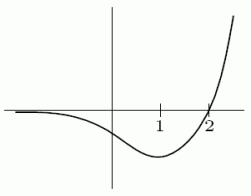
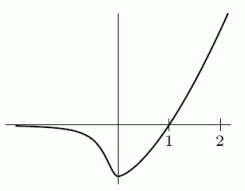
A)The function in graph A is the derivative of the function in graph B.
B)The function in graph B is the derivative of the function in graph A.
C)Neither function is the derivative of the other.


A)The function in graph A is the derivative of the function in graph B.
B)The function in graph B is the derivative of the function in graph A.
C)Neither function is the derivative of the other.

Unlock Deck
Unlock for access to all 132 flashcards in this deck.
Unlock Deck
k this deck
25
Estimate the value of  using the following table. Use the nearest right-hand value to make your estimate.
using the following table. Use the nearest right-hand value to make your estimate. 
 using the following table. Use the nearest right-hand value to make your estimate.
using the following table. Use the nearest right-hand value to make your estimate. 

Unlock Deck
Unlock for access to all 132 flashcards in this deck.
Unlock Deck
k this deck
26
A certain bacterial colony was observed for several hours and the following conditions were reported. Let  be the number of bacteria present after t hours.
be the number of bacteria present after t hours.  There were 1000 bacteria after 5 hours.
There were 1000 bacteria after 5 hours.  The growth rate was never negative and never exceeded 100 per hour.
The growth rate was never negative and never exceeded 100 per hour.  The growth rate was decreasing for the first 5 hours.
The growth rate was decreasing for the first 5 hours.  At 7 hours, the growth rate was zero.
At 7 hours, the growth rate was zero.
Is it possible that ?
?
 be the number of bacteria present after t hours.
be the number of bacteria present after t hours.  There were 1000 bacteria after 5 hours.
There were 1000 bacteria after 5 hours.  The growth rate was never negative and never exceeded 100 per hour.
The growth rate was never negative and never exceeded 100 per hour.  The growth rate was decreasing for the first 5 hours.
The growth rate was decreasing for the first 5 hours.  At 7 hours, the growth rate was zero.
At 7 hours, the growth rate was zero.Is it possible that
 ?
?
Unlock Deck
Unlock for access to all 132 flashcards in this deck.
Unlock Deck
k this deck
27
Let  be the time, in minutes, that it takes for an oven to heat up to
be the time, in minutes, that it takes for an oven to heat up to  F. What are the units of
F. What are the units of  ?
?
A)degrees per minute
B)minutes per degree
 be the time, in minutes, that it takes for an oven to heat up to
be the time, in minutes, that it takes for an oven to heat up to  F. What are the units of
F. What are the units of  ?
?A)degrees per minute
B)minutes per degree

Unlock Deck
Unlock for access to all 132 flashcards in this deck.
Unlock Deck
k this deck
28
Using the following table, tell whether  is likely greater than 0, likely less than 0, or might be equal to 0. Type "<",">", or "=".
is likely greater than 0, likely less than 0, or might be equal to 0. Type "<",">", or "=". 
 is likely greater than 0, likely less than 0, or might be equal to 0. Type "<",">", or "=".
is likely greater than 0, likely less than 0, or might be equal to 0. Type "<",">", or "=". 

Unlock Deck
Unlock for access to all 132 flashcards in this deck.
Unlock Deck
k this deck
29
The distance that a bird flies is measured by y miles for x minutes, and is given by the function  . What are the units of
. What are the units of
A) and
and
B) ?
?
 . What are the units of
. What are the units of A)
 and
and B)
 ?
?
Unlock Deck
Unlock for access to all 132 flashcards in this deck.
Unlock Deck
k this deck
30
Considering the graphs below, could f(x) be the derivative of g(x)? 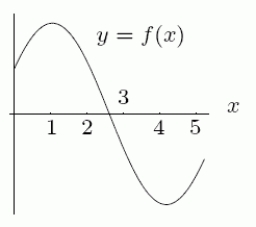
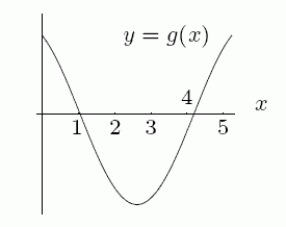



Unlock Deck
Unlock for access to all 132 flashcards in this deck.
Unlock Deck
k this deck
31
Using the graph of  , at x=C is
, at x=C is  positive ?
positive ? 
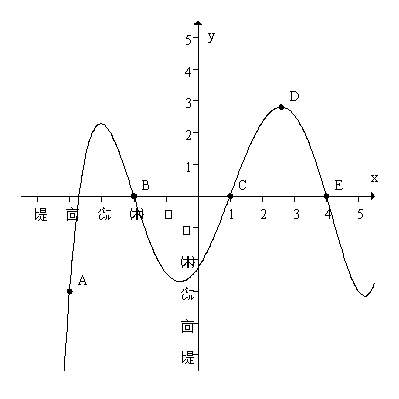
 , at x=C is
, at x=C is  positive ?
positive ? 


Unlock Deck
Unlock for access to all 132 flashcards in this deck.
Unlock Deck
k this deck
32
Suppose  is the height in inches of a person who is t years old. Would you expect
is the height in inches of a person who is t years old. Would you expect  to be
to be
A)greater than 0
B)less than 0
C)equal to 0
 is the height in inches of a person who is t years old. Would you expect
is the height in inches of a person who is t years old. Would you expect  to be
to beA)greater than 0
B)less than 0
C)equal to 0

Unlock Deck
Unlock for access to all 132 flashcards in this deck.
Unlock Deck
k this deck
33
Consider the two functions shown below. A. B. 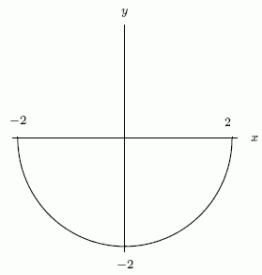
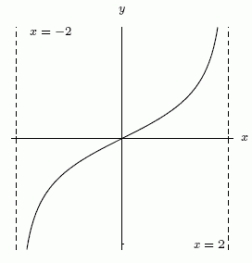
A)The function in graph A is the derivative of the function in graph B.
B)The function in graph B is the derivative of the function in graph A.
C)Neither function is the derivative of the other.


A)The function in graph A is the derivative of the function in graph B.
B)The function in graph B is the derivative of the function in graph A.
C)Neither function is the derivative of the other.

Unlock Deck
Unlock for access to all 132 flashcards in this deck.
Unlock Deck
k this deck
34
Consider the two functions shown below. A. B. 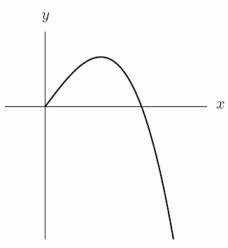
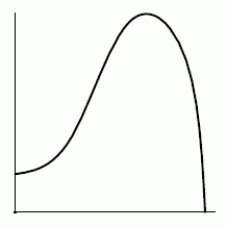
A)The function in graph A is the derivative of the function in graph B.
B)The function in graph B is the derivative of the function in graph A.
C)Neither function is the derivative of the other.


A)The function in graph A is the derivative of the function in graph B.
B)The function in graph B is the derivative of the function in graph A.
C)Neither function is the derivative of the other.

Unlock Deck
Unlock for access to all 132 flashcards in this deck.
Unlock Deck
k this deck
35
Let  be the temperature in degrees Celsius at a height h (in meters) above the surface of the earth. Which of the following gives the rate of change of temperature with respect to a height at 70 meters above the surface of the earth, in degrees per meter?
be the temperature in degrees Celsius at a height h (in meters) above the surface of the earth. Which of the following gives the rate of change of temperature with respect to a height at 70 meters above the surface of the earth, in degrees per meter?
A)
B)
C)h such that
D)h such that
 be the temperature in degrees Celsius at a height h (in meters) above the surface of the earth. Which of the following gives the rate of change of temperature with respect to a height at 70 meters above the surface of the earth, in degrees per meter?
be the temperature in degrees Celsius at a height h (in meters) above the surface of the earth. Which of the following gives the rate of change of temperature with respect to a height at 70 meters above the surface of the earth, in degrees per meter?A)

B)

C)h such that

D)h such that


Unlock Deck
Unlock for access to all 132 flashcards in this deck.
Unlock Deck
k this deck
36
Suppose that  is the cost to heat my house, in dollars per day, when the outside temperature is
is the cost to heat my house, in dollars per day, when the outside temperature is  Fahrenheit. If
Fahrenheit. If  and
and  , approximately what is the cost to heat my house when the temperature is
, approximately what is the cost to heat my house when the temperature is  ?
?
 is the cost to heat my house, in dollars per day, when the outside temperature is
is the cost to heat my house, in dollars per day, when the outside temperature is  Fahrenheit. If
Fahrenheit. If  and
and  , approximately what is the cost to heat my house when the temperature is
, approximately what is the cost to heat my house when the temperature is  ?
?
Unlock Deck
Unlock for access to all 132 flashcards in this deck.
Unlock Deck
k this deck
37
Let  be the time, in minutes, that it takes for an oven to heat up to
be the time, in minutes, that it takes for an oven to heat up to  F. What is the sign of
F. What is the sign of  ?
?
A)positive
B)negative
 be the time, in minutes, that it takes for an oven to heat up to
be the time, in minutes, that it takes for an oven to heat up to  F. What is the sign of
F. What is the sign of  ?
?A)positive
B)negative

Unlock Deck
Unlock for access to all 132 flashcards in this deck.
Unlock Deck
k this deck
38
The graph below is the graph of  , the derivative of
, the derivative of  . At 2 is the original function M(x) increasing, decreasing, constant or undefined?
. At 2 is the original function M(x) increasing, decreasing, constant or undefined? 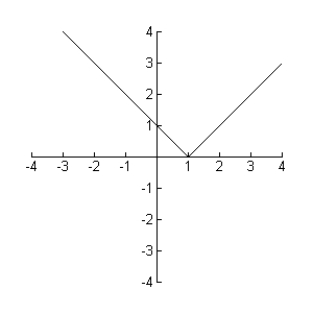
 , the derivative of
, the derivative of  . At 2 is the original function M(x) increasing, decreasing, constant or undefined?
. At 2 is the original function M(x) increasing, decreasing, constant or undefined? 

Unlock Deck
Unlock for access to all 132 flashcards in this deck.
Unlock Deck
k this deck
39
Let  be the fuel efficiency of a car moving at v miles per hour. with efficiency measured in miles per gallon. Suppose
be the fuel efficiency of a car moving at v miles per hour. with efficiency measured in miles per gallon. Suppose  and
and  . What would you expect
. What would you expect  to be?
to be?
 be the fuel efficiency of a car moving at v miles per hour. with efficiency measured in miles per gallon. Suppose
be the fuel efficiency of a car moving at v miles per hour. with efficiency measured in miles per gallon. Suppose  and
and  . What would you expect
. What would you expect  to be?
to be?
Unlock Deck
Unlock for access to all 132 flashcards in this deck.
Unlock Deck
k this deck
40
Consider the two functions shown below. A. B. 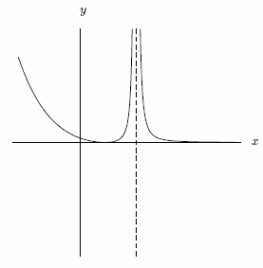
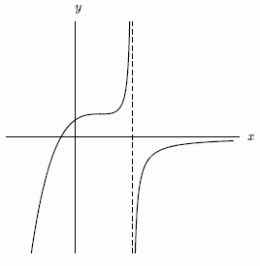
A)The function in graph A is the derivative of the function in graph B.
B)The function in graph B is the derivative of the function in graph A.
C)Neither function is the derivative of the other.


A)The function in graph A is the derivative of the function in graph B.
B)The function in graph B is the derivative of the function in graph A.
C)Neither function is the derivative of the other.

Unlock Deck
Unlock for access to all 132 flashcards in this deck.
Unlock Deck
k this deck
41
The following table gives the wind chill factor (  ) as a function of the wind speed (miles/hour) when the air temperature is 20
) as a function of the wind speed (miles/hour) when the air temperature is 20  . What is the derivative of wind chill with respect to wind speed when the air temperature is 20
. What is the derivative of wind chill with respect to wind speed when the air temperature is 20  and the wind speed is 20 miles per hour? Use the nearest right-hand value to make your estimate.
and the wind speed is 20 miles per hour? Use the nearest right-hand value to make your estimate. 
 ) as a function of the wind speed (miles/hour) when the air temperature is 20
) as a function of the wind speed (miles/hour) when the air temperature is 20  . What is the derivative of wind chill with respect to wind speed when the air temperature is 20
. What is the derivative of wind chill with respect to wind speed when the air temperature is 20  and the wind speed is 20 miles per hour? Use the nearest right-hand value to make your estimate.
and the wind speed is 20 miles per hour? Use the nearest right-hand value to make your estimate. 

Unlock Deck
Unlock for access to all 132 flashcards in this deck.
Unlock Deck
k this deck
42
Let  be the temperature in degrees Celsius at a height h (in meters) above the surface of the earth. Which of the following gives the temperature in degrees Celsius at a height of 1000 meters?
be the temperature in degrees Celsius at a height h (in meters) above the surface of the earth. Which of the following gives the temperature in degrees Celsius at a height of 1000 meters?
A)
B)
C)h such that
D)h such that
 be the temperature in degrees Celsius at a height h (in meters) above the surface of the earth. Which of the following gives the temperature in degrees Celsius at a height of 1000 meters?
be the temperature in degrees Celsius at a height h (in meters) above the surface of the earth. Which of the following gives the temperature in degrees Celsius at a height of 1000 meters?A)

B)

C)h such that

D)h such that


Unlock Deck
Unlock for access to all 132 flashcards in this deck.
Unlock Deck
k this deck
43
Let  represent the dollar amount charged per hour by a computer consultant to a client when they sign a contract t hours of work. The consultant gives a discount to the client if the contract is increased by 10 hours. Estimate the amount charged per hour when the client orders 130 hours of work.
represent the dollar amount charged per hour by a computer consultant to a client when they sign a contract t hours of work. The consultant gives a discount to the client if the contract is increased by 10 hours. Estimate the amount charged per hour when the client orders 130 hours of work.
 represent the dollar amount charged per hour by a computer consultant to a client when they sign a contract t hours of work. The consultant gives a discount to the client if the contract is increased by 10 hours. Estimate the amount charged per hour when the client orders 130 hours of work.
represent the dollar amount charged per hour by a computer consultant to a client when they sign a contract t hours of work. The consultant gives a discount to the client if the contract is increased by 10 hours. Estimate the amount charged per hour when the client orders 130 hours of work.
Unlock Deck
Unlock for access to all 132 flashcards in this deck.
Unlock Deck
k this deck
44
The following table gives the wind chill factor (  ) as a function of the wind speed (miles/hour) when the air temperature is 20
) as a function of the wind speed (miles/hour) when the air temperature is 20  . What are the units for the derivative of wind chill with respect to wind speed when the air temperature is 20
. What are the units for the derivative of wind chill with respect to wind speed when the air temperature is 20  ?
? 
A)mph/
B) /mph
/mph
 ) as a function of the wind speed (miles/hour) when the air temperature is 20
) as a function of the wind speed (miles/hour) when the air temperature is 20  . What are the units for the derivative of wind chill with respect to wind speed when the air temperature is 20
. What are the units for the derivative of wind chill with respect to wind speed when the air temperature is 20  ?
? 
A)mph/

B)
 /mph
/mph
Unlock Deck
Unlock for access to all 132 flashcards in this deck.
Unlock Deck
k this deck
45
Let  represent the dollar amount charged per hour by a computer consultant to a client when they sign a contract t hours of work. The consultant gives a discount to the client if the contract is increased by 10 hours. Interpret the following statements.
represent the dollar amount charged per hour by a computer consultant to a client when they sign a contract t hours of work. The consultant gives a discount to the client if the contract is increased by 10 hours. Interpret the following statements.
A) .
.
B) .
.
 represent the dollar amount charged per hour by a computer consultant to a client when they sign a contract t hours of work. The consultant gives a discount to the client if the contract is increased by 10 hours. Interpret the following statements.
represent the dollar amount charged per hour by a computer consultant to a client when they sign a contract t hours of work. The consultant gives a discount to the client if the contract is increased by 10 hours. Interpret the following statements. A)
 .
. B)
 .
.
Unlock Deck
Unlock for access to all 132 flashcards in this deck.
Unlock Deck
k this deck
46
To study traffic flow along a major road, the city installs a device at the edge of the road at 4:00 am. The device counts the cars driving past, and records the total periodically. The resulting data is plotted on a graph, with time (in hours) on the horizontal axis and the number of cars on the vertical axis. The graph is shown below. It is a graph of the function  = Total number of cars that have passed by after t hours. When is the traffic flow the greatest?
= Total number of cars that have passed by after t hours. When is the traffic flow the greatest? 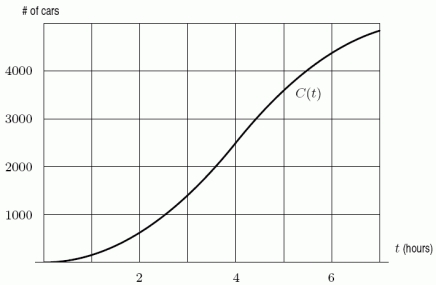
A)At t=6 hours.
B)At t=3 hours.
C)At t=4 hours.
D)At t=5 hours.
 = Total number of cars that have passed by after t hours. When is the traffic flow the greatest?
= Total number of cars that have passed by after t hours. When is the traffic flow the greatest? 
A)At t=6 hours.
B)At t=3 hours.
C)At t=4 hours.
D)At t=5 hours.

Unlock Deck
Unlock for access to all 132 flashcards in this deck.
Unlock Deck
k this deck
47
Let  be the temperature in degrees Celsius at a height h (in meters) above the surface of the earth. Which of the following gives the height, in meters, at which the rate of change of temperature with respect to height is 25 degrees per meter?
be the temperature in degrees Celsius at a height h (in meters) above the surface of the earth. Which of the following gives the height, in meters, at which the rate of change of temperature with respect to height is 25 degrees per meter?
A)
B)
C)h such that
D)h such that
 be the temperature in degrees Celsius at a height h (in meters) above the surface of the earth. Which of the following gives the height, in meters, at which the rate of change of temperature with respect to height is 25 degrees per meter?
be the temperature in degrees Celsius at a height h (in meters) above the surface of the earth. Which of the following gives the height, in meters, at which the rate of change of temperature with respect to height is 25 degrees per meter?A)

B)

C)h such that

D)h such that


Unlock Deck
Unlock for access to all 132 flashcards in this deck.
Unlock Deck
k this deck
48
Let  be the amount of lumber, in board-feet, produced from a tree of radius r (measured in inches). Which of the following gives the rate of change in the amount of lumber, in board-feet per inch, with respect to the radius when the radius is 21 inches?
be the amount of lumber, in board-feet, produced from a tree of radius r (measured in inches). Which of the following gives the rate of change in the amount of lumber, in board-feet per inch, with respect to the radius when the radius is 21 inches?
A)
B)
C)r such that
D)r such that
 be the amount of lumber, in board-feet, produced from a tree of radius r (measured in inches). Which of the following gives the rate of change in the amount of lumber, in board-feet per inch, with respect to the radius when the radius is 21 inches?
be the amount of lumber, in board-feet, produced from a tree of radius r (measured in inches). Which of the following gives the rate of change in the amount of lumber, in board-feet per inch, with respect to the radius when the radius is 21 inches?A)

B)

C)r such that

D)r such that


Unlock Deck
Unlock for access to all 132 flashcards in this deck.
Unlock Deck
k this deck
49
To study traffic flow along a major road, the city installs a device at the edge of the road at 4:00 am. The device counts the cars driving past, and records the total periodically. The resulting data is plotted on a graph, with time (in hours) on the horizontal axis and the number of cars on the vertical axis. The graph is shown below. It is a graph of the function  = Total number of cars that have passed by after t hours. Estimate
= Total number of cars that have passed by after t hours. Estimate  .
. 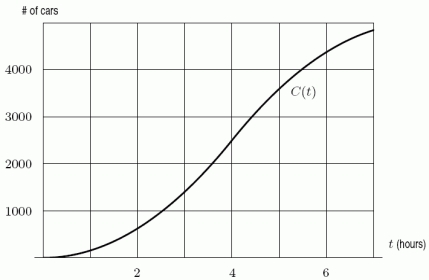
A)1000
B)1300
C)1600
D)1900
 = Total number of cars that have passed by after t hours. Estimate
= Total number of cars that have passed by after t hours. Estimate  .
. 
A)1000
B)1300
C)1600
D)1900

Unlock Deck
Unlock for access to all 132 flashcards in this deck.
Unlock Deck
k this deck
50
Every day the Undergraduate Office of Admissions receives inquiries from eager high school students (e.g. "Please send me an application",etc.) They keep a running count of the number of inquiries received each day, along with the total number received until that point. Below is a table of weekly figures from about the end of August to about the end of October of a recent year. One of these columns can be interpreted as a rate of change. Which one is it? 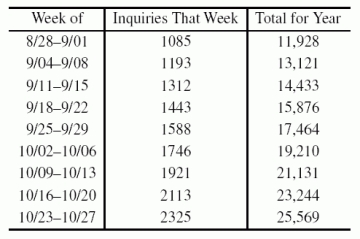
A)"Week of"
B)"Inquiries That Week"
C)"Total for Year"

A)"Week of"
B)"Inquiries That Week"
C)"Total for Year"

Unlock Deck
Unlock for access to all 132 flashcards in this deck.
Unlock Deck
k this deck
51
Let  be the amount of lumber, in board-feet, produced from a tree of radius r (measured in inches). Which of the following gives the radius (in inches) of a tree that produces 150 board-feet of lumber ?
be the amount of lumber, in board-feet, produced from a tree of radius r (measured in inches). Which of the following gives the radius (in inches) of a tree that produces 150 board-feet of lumber ?
A)
B)
C)r such that
D)r such that
 be the amount of lumber, in board-feet, produced from a tree of radius r (measured in inches). Which of the following gives the radius (in inches) of a tree that produces 150 board-feet of lumber ?
be the amount of lumber, in board-feet, produced from a tree of radius r (measured in inches). Which of the following gives the radius (in inches) of a tree that produces 150 board-feet of lumber ?A)

B)

C)r such that

D)r such that


Unlock Deck
Unlock for access to all 132 flashcards in this deck.
Unlock Deck
k this deck
52
The population of a certain town is given by the function  where t is the number of years since the town was incorporated. If
where t is the number of years since the town was incorporated. If  is constant for t >185, what will
is constant for t >185, what will  be if
be if  and
and  ?
?
 where t is the number of years since the town was incorporated. If
where t is the number of years since the town was incorporated. If  is constant for t >185, what will
is constant for t >185, what will  be if
be if  and
and  ?
?
Unlock Deck
Unlock for access to all 132 flashcards in this deck.
Unlock Deck
k this deck
53
The following table shows the number of oranges sold in one month,  , against the price per bag, p (in cents). Find an approximation for
, against the price per bag, p (in cents). Find an approximation for  . Use the nearest right-hand value to make your estimate.
. Use the nearest right-hand value to make your estimate. 
 , against the price per bag, p (in cents). Find an approximation for
, against the price per bag, p (in cents). Find an approximation for  . Use the nearest right-hand value to make your estimate.
. Use the nearest right-hand value to make your estimate. 

Unlock Deck
Unlock for access to all 132 flashcards in this deck.
Unlock Deck
k this deck
54
The noise level, N, in decibels, of a rock concert is given by  , where d is the distance in meters from the concert speakers. Which of the following gives the rate of change, in decibels per meter, of noise 600 meters away from the speakers?
, where d is the distance in meters from the concert speakers. Which of the following gives the rate of change, in decibels per meter, of noise 600 meters away from the speakers?
A)
B)
C)d such that
D)d such that
 , where d is the distance in meters from the concert speakers. Which of the following gives the rate of change, in decibels per meter, of noise 600 meters away from the speakers?
, where d is the distance in meters from the concert speakers. Which of the following gives the rate of change, in decibels per meter, of noise 600 meters away from the speakers?A)

B)

C)d such that

D)d such that


Unlock Deck
Unlock for access to all 132 flashcards in this deck.
Unlock Deck
k this deck
55
The graph of  is shown in the following figure. Is
is shown in the following figure. Is  positive, negative, or zero?
positive, negative, or zero? 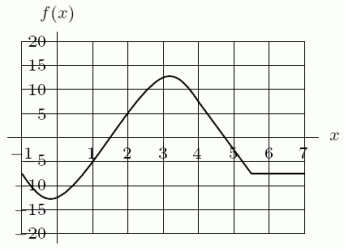
A)zero
B)positive
C)negative
 is shown in the following figure. Is
is shown in the following figure. Is  positive, negative, or zero?
positive, negative, or zero? 
A)zero
B)positive
C)negative

Unlock Deck
Unlock for access to all 132 flashcards in this deck.
Unlock Deck
k this deck
56
The noise level, N, in decibels, of a rock concert is given by  , where d is the distance in meters from the concert speakers. Which of the following gives the distance, in meters, away from the speakers at which the noise is 80 decibels?
, where d is the distance in meters from the concert speakers. Which of the following gives the distance, in meters, away from the speakers at which the noise is 80 decibels?
A)
B)
C)d such that
D)d such that
 , where d is the distance in meters from the concert speakers. Which of the following gives the distance, in meters, away from the speakers at which the noise is 80 decibels?
, where d is the distance in meters from the concert speakers. Which of the following gives the distance, in meters, away from the speakers at which the noise is 80 decibels?A)

B)

C)d such that

D)d such that


Unlock Deck
Unlock for access to all 132 flashcards in this deck.
Unlock Deck
k this deck
57
Let  be the amount of lumber, in board-feet, produced from a tree of radius r (measured in inches). Which of the following gives the number of board-feet obtained from a tree of radius 8 inches?
be the amount of lumber, in board-feet, produced from a tree of radius r (measured in inches). Which of the following gives the number of board-feet obtained from a tree of radius 8 inches?
A)
B)
C)r such that
D)r such that
 be the amount of lumber, in board-feet, produced from a tree of radius r (measured in inches). Which of the following gives the number of board-feet obtained from a tree of radius 8 inches?
be the amount of lumber, in board-feet, produced from a tree of radius r (measured in inches). Which of the following gives the number of board-feet obtained from a tree of radius 8 inches?A)

B)

C)r such that

D)r such that


Unlock Deck
Unlock for access to all 132 flashcards in this deck.
Unlock Deck
k this deck
58
The cost of extracting T tons of ore from a copper mine is  dollars. Would you expect
dollars. Would you expect  to be positive or negative?
to be positive or negative?
A)positive
B)negative
 dollars. Would you expect
dollars. Would you expect  to be positive or negative?
to be positive or negative?A)positive
B)negative

Unlock Deck
Unlock for access to all 132 flashcards in this deck.
Unlock Deck
k this deck
59
The graph of  is shown in the following figure. Give an estimate for
is shown in the following figure. Give an estimate for 
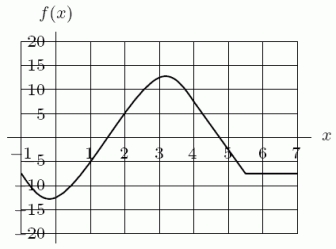
A)-10
B)10
C)-20
D)20
 is shown in the following figure. Give an estimate for
is shown in the following figure. Give an estimate for 

A)-10
B)10
C)-20
D)20

Unlock Deck
Unlock for access to all 132 flashcards in this deck.
Unlock Deck
k this deck
60
The cost of extracting T tons of ore from a copper mine is  dollars. What are the units for
dollars. What are the units for  ?
?
A)dollars/ton
B)tons/dollar
 dollars. What are the units for
dollars. What are the units for  ?
?A)dollars/ton
B)tons/dollar

Unlock Deck
Unlock for access to all 132 flashcards in this deck.
Unlock Deck
k this deck
61
A company graphs  , the derivative of the number of pints of ice cream sold over the past ten years. Out of t=1,2,4,8, and 10, in what year was C ''(t) greatest?
, the derivative of the number of pints of ice cream sold over the past ten years. Out of t=1,2,4,8, and 10, in what year was C ''(t) greatest? 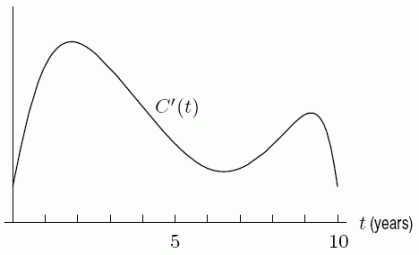
 , the derivative of the number of pints of ice cream sold over the past ten years. Out of t=1,2,4,8, and 10, in what year was C ''(t) greatest?
, the derivative of the number of pints of ice cream sold over the past ten years. Out of t=1,2,4,8, and 10, in what year was C ''(t) greatest? 

Unlock Deck
Unlock for access to all 132 flashcards in this deck.
Unlock Deck
k this deck
62
Suppose the graph of f is in the figure below. Is  positive, negative, or zero?
positive, negative, or zero? 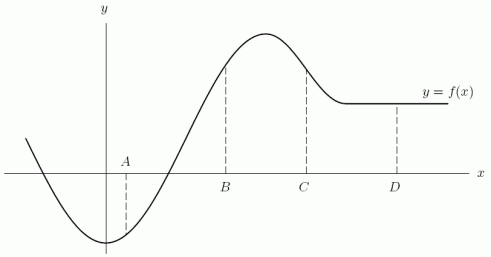
 positive, negative, or zero?
positive, negative, or zero? 

Unlock Deck
Unlock for access to all 132 flashcards in this deck.
Unlock Deck
k this deck
63
The cost of mining a ton of coal is rising faster every year. Suppose  is the cost of mining a ton of coal at time t. Which of the following must be concave up? Select all that apply.
is the cost of mining a ton of coal at time t. Which of the following must be concave up? Select all that apply.
A)
B)
C)
 is the cost of mining a ton of coal at time t. Which of the following must be concave up? Select all that apply.
is the cost of mining a ton of coal at time t. Which of the following must be concave up? Select all that apply.A)

B)

C)


Unlock Deck
Unlock for access to all 132 flashcards in this deck.
Unlock Deck
k this deck
64
Consider the function f sketched in the following figure. Do you expect  to be positive, negative, or zero?
to be positive, negative, or zero? 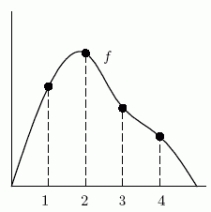
 to be positive, negative, or zero?
to be positive, negative, or zero? 

Unlock Deck
Unlock for access to all 132 flashcards in this deck.
Unlock Deck
k this deck
65
Cost and revenue functions for a certain chemical manufacturer are given in the following figure. How much does it cost to produce 10 tons? 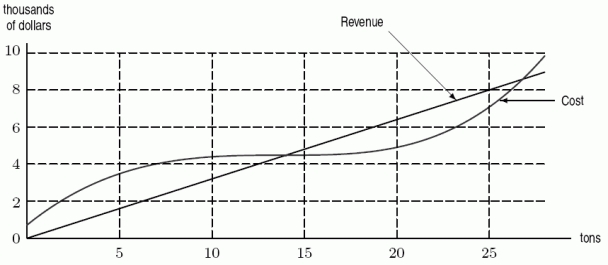
A)$4,500
B)$3,200
C)$4.50
D)$3.20

A)$4,500
B)$3,200
C)$4.50
D)$3.20

Unlock Deck
Unlock for access to all 132 flashcards in this deck.
Unlock Deck
k this deck
66
Consider the function f sketched in the following figure. Do you expect  to be positive, negative, or zero?
to be positive, negative, or zero? 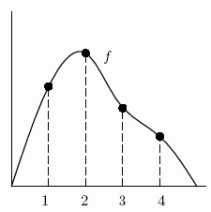
 to be positive, negative, or zero?
to be positive, negative, or zero? 

Unlock Deck
Unlock for access to all 132 flashcards in this deck.
Unlock Deck
k this deck
67
Consider the following graph. In region III,  is ________ (positive/negative) and
is ________ (positive/negative) and  is ________ (positive/negative).
is ________ (positive/negative). 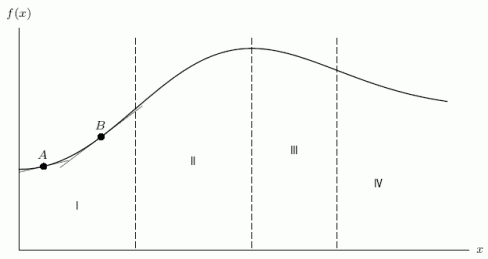
 is ________ (positive/negative) and
is ________ (positive/negative) and  is ________ (positive/negative).
is ________ (positive/negative). 

Unlock Deck
Unlock for access to all 132 flashcards in this deck.
Unlock Deck
k this deck
68
Suppose a function is given by the following table of values. Estimate the instantaneous rate of change of f at x=1.7, and use this estimate to find the equation for the tangent line to f at x=1.7. The line is y = _____x+_____. Use the nearest right-hand value to make your estimate. 


Unlock Deck
Unlock for access to all 132 flashcards in this deck.
Unlock Deck
k this deck
69
A driver obeys the speed limit as she travels past different towns in the order A, B, C. In town A, the speed limit is 35 mph. In town B, the speed limit is 60 mph, and in town C the speed limit is 55 mph. It always takes her two minutes to reach the new speed limit when she passes by a new town. If  represents the driver's position at time t, then is
represents the driver's position at time t, then is  for the first two minutes she is passing town B positive or negative?
for the first two minutes she is passing town B positive or negative?
 represents the driver's position at time t, then is
represents the driver's position at time t, then is  for the first two minutes she is passing town B positive or negative?
for the first two minutes she is passing town B positive or negative?
Unlock Deck
Unlock for access to all 132 flashcards in this deck.
Unlock Deck
k this deck
70
The cost of mining a ton of coal is rising faster every year. Suppose  is the cost of mining a ton of coal at time t. Which of the following must be positive? Select all that apply.
is the cost of mining a ton of coal at time t. Which of the following must be positive? Select all that apply.
A)
B)
C)
 is the cost of mining a ton of coal at time t. Which of the following must be positive? Select all that apply.
is the cost of mining a ton of coal at time t. Which of the following must be positive? Select all that apply.A)

B)

C)


Unlock Deck
Unlock for access to all 132 flashcards in this deck.
Unlock Deck
k this deck
71
Suppose a function is given by the following table of values. Is  most likely positive or negative at x=1.9?
most likely positive or negative at x=1.9? 
A)positive
B)negative
 most likely positive or negative at x=1.9?
most likely positive or negative at x=1.9? 
A)positive
B)negative

Unlock Deck
Unlock for access to all 132 flashcards in this deck.
Unlock Deck
k this deck
72
Using the graph of  , at x=D is
, at x=D is  positive, negative or zero?
positive, negative or zero? 
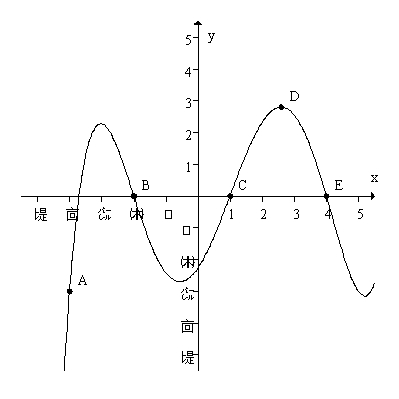
 , at x=D is
, at x=D is  positive, negative or zero?
positive, negative or zero? 


Unlock Deck
Unlock for access to all 132 flashcards in this deck.
Unlock Deck
k this deck
73
Write the Leibniz notation for the first and second derivatives of the given function and include units.
"The amount of paint, G, in gallons, is a function of time m, in minutes"
"The amount of paint, G, in gallons, is a function of time m, in minutes"

Unlock Deck
Unlock for access to all 132 flashcards in this deck.
Unlock Deck
k this deck
74
Suppose the graph of f is in the figure below. Is  positive, negative, or zero?
positive, negative, or zero? 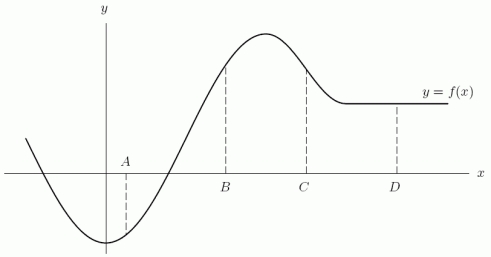
 positive, negative, or zero?
positive, negative, or zero? 

Unlock Deck
Unlock for access to all 132 flashcards in this deck.
Unlock Deck
k this deck
75
A function f satisfies the following conditions:  ,
,  ,
,  ,
,  , and
, and  for
for  . Which of the following are possible values for
. Which of the following are possible values for  ? Select all that apply.
? Select all that apply.
A)4
B)8
C)14
 ,
,  ,
,  ,
,  , and
, and  for
for  . Which of the following are possible values for
. Which of the following are possible values for  ? Select all that apply.
? Select all that apply.A)4
B)8
C)14

Unlock Deck
Unlock for access to all 132 flashcards in this deck.
Unlock Deck
k this deck
76
Consider the function f sketched in the following figure. Do you expect  to be positive, negative, or zero?
to be positive, negative, or zero? 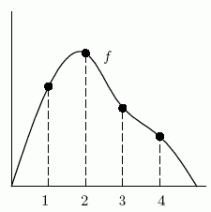
 to be positive, negative, or zero?
to be positive, negative, or zero? 

Unlock Deck
Unlock for access to all 132 flashcards in this deck.
Unlock Deck
k this deck
77
Let  represent the number of students enrolled in school in the year t. If enrollment is decreasing steadily, then
represent the number of students enrolled in school in the year t. If enrollment is decreasing steadily, then  _____0 and
_____0 and  _____0. (Enter "<",">", or "=")
_____0. (Enter "<",">", or "=")
 represent the number of students enrolled in school in the year t. If enrollment is decreasing steadily, then
represent the number of students enrolled in school in the year t. If enrollment is decreasing steadily, then  _____0 and
_____0 and  _____0. (Enter "<",">", or "=")
_____0. (Enter "<",">", or "=")
Unlock Deck
Unlock for access to all 132 flashcards in this deck.
Unlock Deck
k this deck
78
Could the function on the right be the second derivative of the function on the left? 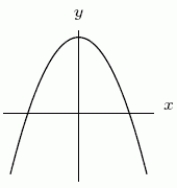
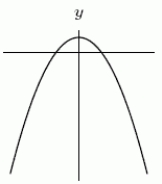



Unlock Deck
Unlock for access to all 132 flashcards in this deck.
Unlock Deck
k this deck
79
The cost of mining a ton of coal is rising faster every year. Suppose  is the cost of mining a ton of coal at time t. Which of the following must be increasing? Select all that apply.
is the cost of mining a ton of coal at time t. Which of the following must be increasing? Select all that apply.
A)
B)
C)
 is the cost of mining a ton of coal at time t. Which of the following must be increasing? Select all that apply.
is the cost of mining a ton of coal at time t. Which of the following must be increasing? Select all that apply.A)

B)

C)


Unlock Deck
Unlock for access to all 132 flashcards in this deck.
Unlock Deck
k this deck
80
Suppose the graph of f is in the figure below. Is f (B) positive, negative, or zero? 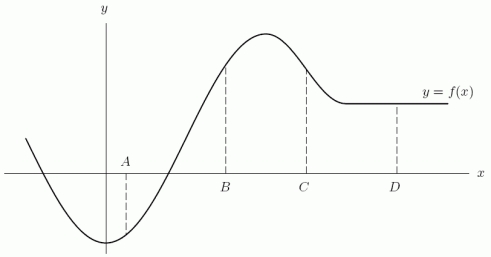


Unlock Deck
Unlock for access to all 132 flashcards in this deck.
Unlock Deck
k this deck


